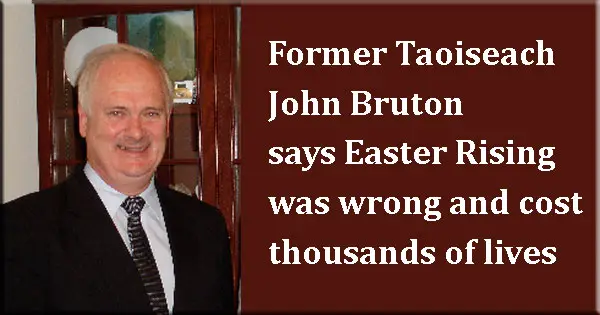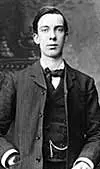Former Taoiseach John Bruton has caused controversy by criticising the leaders of the Easter Rising of 1916.

He accused them of “fighting against their fellow Irishmen” and using unnecessary violence to achieve their goals.
Bruton also said that the rebels’ use of violence paved the way for thousands of lives to be lost in the following conflicts of the War of Independence and the Civil War.
He was speaking at a lecture on John Redmond, the Irish head of parliament at the time of the Rising. He said: “Many of the 1916 leaders were familiar with Catholic teaching on what constitutes a just war. One of the criteria is that war should be a ‘last resort’.
“Given that home rule was already passed, would have come into effect, and would have been a platform for further moves to greater independence, the use of violence in 1916 was not a genuine last resort.
Leaders were opposed to fellow Irishmen
The former Fine Gael leader went on to say that the leaders were directly opposed to their fellow Irishmen, who were fighting in the First World War alongside the British when the Rising took place.
“In proclaiming the Republic, the 1916 leaders spoke of their ‘gallant allies in Europe’. The 1916 leaders were not neutral. They were taking the side of Germany, Turkey and Austria and said so in their own proclamation.
“The 1916 leaders explicitly took the opposite side in this war to their fellow Irishmen in the trenches.
“There is a moral issue here. Irish people today take the taking of life seriously. We have abolished the death penalty. 1916, and the subsequent campaigns of violence it inspired, involved taking thousands of lives.”
Bruton’s comments are sure to cause controversy, as the country prepares to mark the centenary of the Rising in less than 18 months’ time.

The Easter Rising is seen by many as the most significant event in Irish history, and to many the leaders are national heroes.
Pádraig Pearse ordered the rebels to surrender after five days of fighting with the British Army in order to avoid any more unnecessary deaths.
He, along with 15 others, was executed by the authorities after the British had regained control of Dublin. The executions of the leaders was seen as an over-reaction by the Irish public, and a wave of nationalism swept across the country, leading to the War of Independence, and then the Civil War.
easter-rising.html